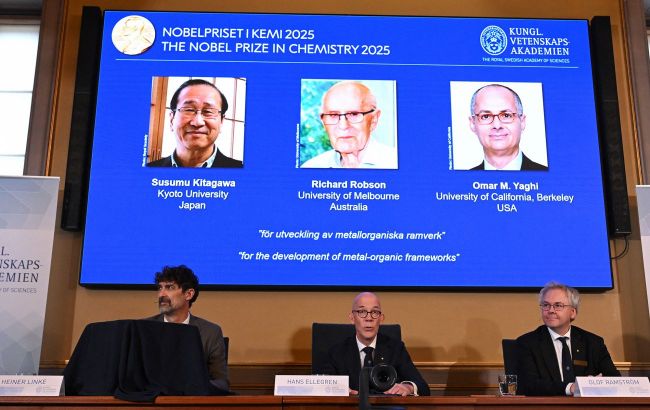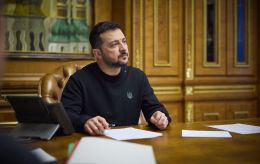2025 Nobel in chemistry: Who just won
 Photo: Nobel Prize 2025 laureates in chemistry announced (Getty Images)
Photo: Nobel Prize 2025 laureates in chemistry announced (Getty Images)
The Nobel Committee on Wednesday, October 8, announced the winners of the 2025 Nobel Prize in Chemistry. The award went to Japanese scientist Susumu Kitagawa, British researcher Richard Robson, and American chemist Omar Yaghi, according to the Nobel Foundation's press service.
What is known about the 2025 chemistry laureates
The scientists were recognized this year for their work on developing metal–organic frameworks (MOFs).
The 2025 Nobel Prize in Chemistry laureates created new molecular structures with large cavities that allow gases and other substances to pass through.
These structures, known as metal–organic frameworks, can be used to extract water from air, capture carbon dioxide, store toxic gases, or accelerate chemical reactions.
The three scientists developed a new form of molecular architecture in which metal ions serve as "building blocks" connected by long organic molecules. Together, they form crystals with large internal cavities.
These materials can be customized. By changing their components, chemists can design MOFs that capture specific substances, conduct electricity, or catalyze reactions.
The research began in 1989, when Richard Robson combined copper ions with special molecules to create a diamond-like crystal filled with pores. His discovery was groundbreaking, though the material itself turned out to be unstable.
Later, Susumu Kitagawa and Omar Yaghi refined the method. In the 1990s and 2000s, they demonstrated that such structures could be flexible, stable, and controllable, meaning they could be designed with specific properties.
Since then, chemists have developed tens of thousands of types of MOFs, which can be applied to solving major global challenges. For example, they can purify water from harmful substances, break down pharmaceutical residues in nature, capture carbon dioxide, or even extract water in desert environments.
Who received the chemistry prize last year?
The Nobel Prize in Chemistry is the most prestigious recognition in the world of chemical sciences. Candidates are nominated through the Nobel Committee for Chemistry, which carefully evaluates their scientific achievements.
This prize is one of the five original Nobel awards established in the late 19th century under the will of Alfred Nobel, the inventor of dynamite, industrialist, and philanthropist.
For Nobel himself, chemistry was a key area of work. His deep knowledge in this field enabled him to develop new inventions and improve technological processes. It is no coincidence that in his will, he singled out chemistry as one of the most important sciences worthy of its own prize.
In 2024, the Nobel Committee decided to divide the chemistry award between two research areas. Half of the prize went to American biochemist David Baker for developing methods of computational protein design.
The other half was shared by British scientist Demis Hassabis and American researcher John Jumper, the creators of an artificial intelligence system that learned to predict the spatial structure of proteins, solving a scientific problem that had remained unsolved for more than 50 years.
Their discoveries have enormous practical value. They help researchers better understand how bacteria develop resistance to antibiotics and open new pathways for creating effective medicines of the future.
Nobel Week 2025
Nobel Week 2025 began on Monday, October 6. The first winners announced were in the field of medicine and physiology. The prize went to American researchers Mary Brunkow and Fred Ramsdell, as well as Japanese scientist Shimon Sakaguchi. They were honored for their groundbreaking studies on peripheral immune tolerance, which help deepen understanding of how the immune system works.
In physics, this year's award will go to John Clarke, Michel Devoret, and John Martinis. Their research focuses on the discovery of macroscopic quantum tunneling and the study of energy quantization in electrical circuits—achievements that expand the possibilities of modern quantum physics.
On October 10, the names of the Nobel Prize in Literature laureates will be announced, followed by the Nobel Peace Prize 2025 on October 11.
This year, special attention surrounds the Peace Prize. Donald Trump has openly declared his desire to win the award. His nomination has been submitted by representatives from several countries, including Pakistan, Cambodia, and Israel, as well as a number of Republican members of the US Congress.
Interestingly, even Ukraine's Verkhovna Rada registered a proposal to nominate the former US president for the Peace Prize.
Trump himself says it would be "an insult" to the United States if he does not receive the award, claiming he "ended seven global conflicts."

